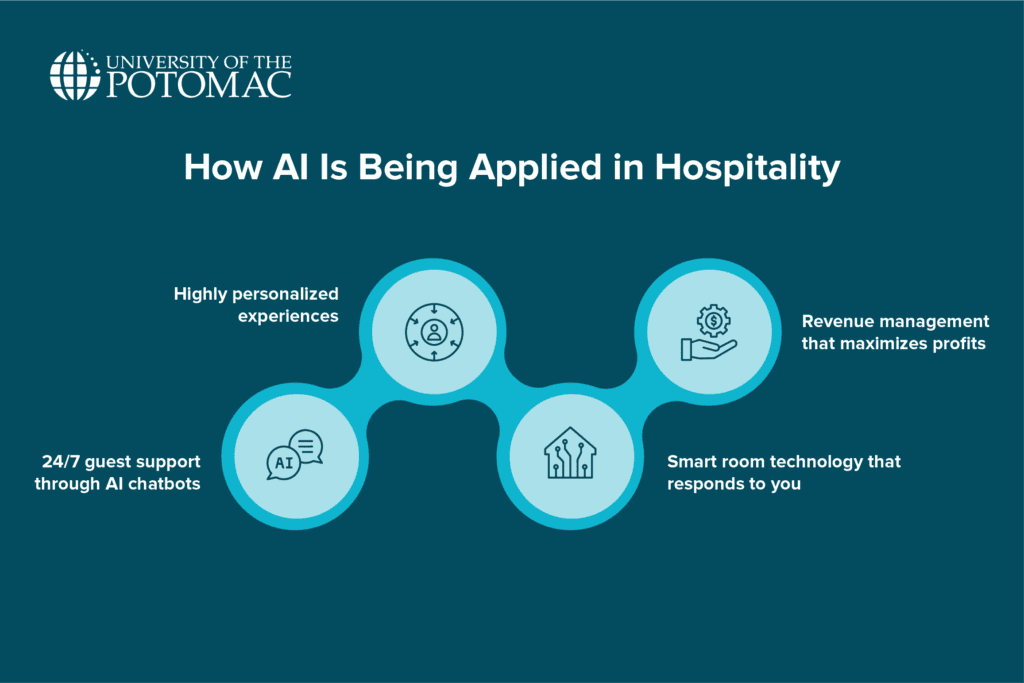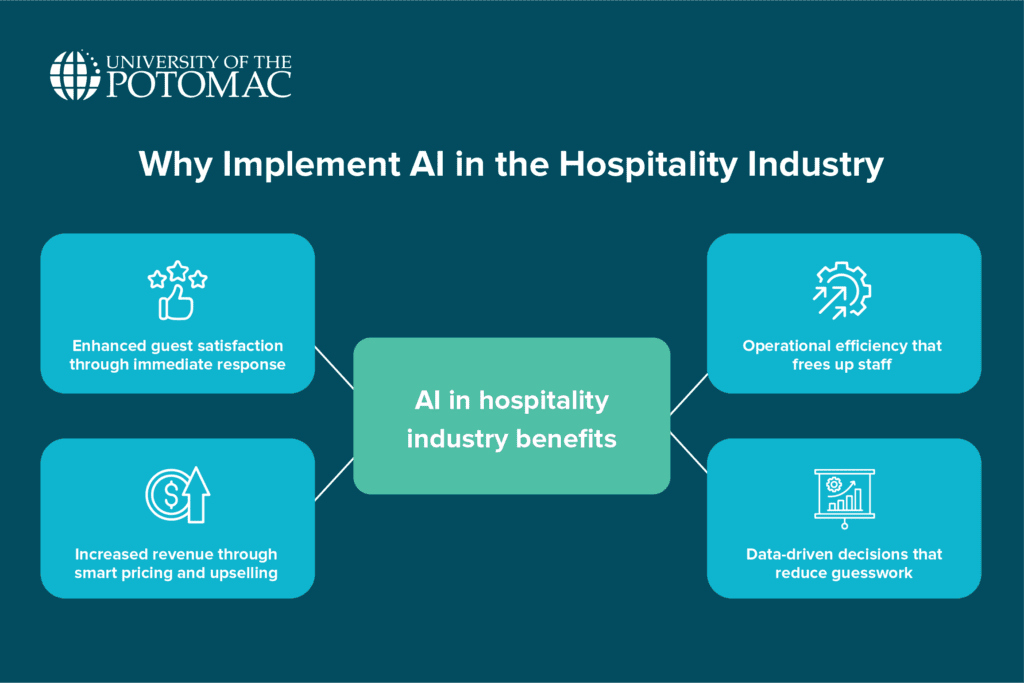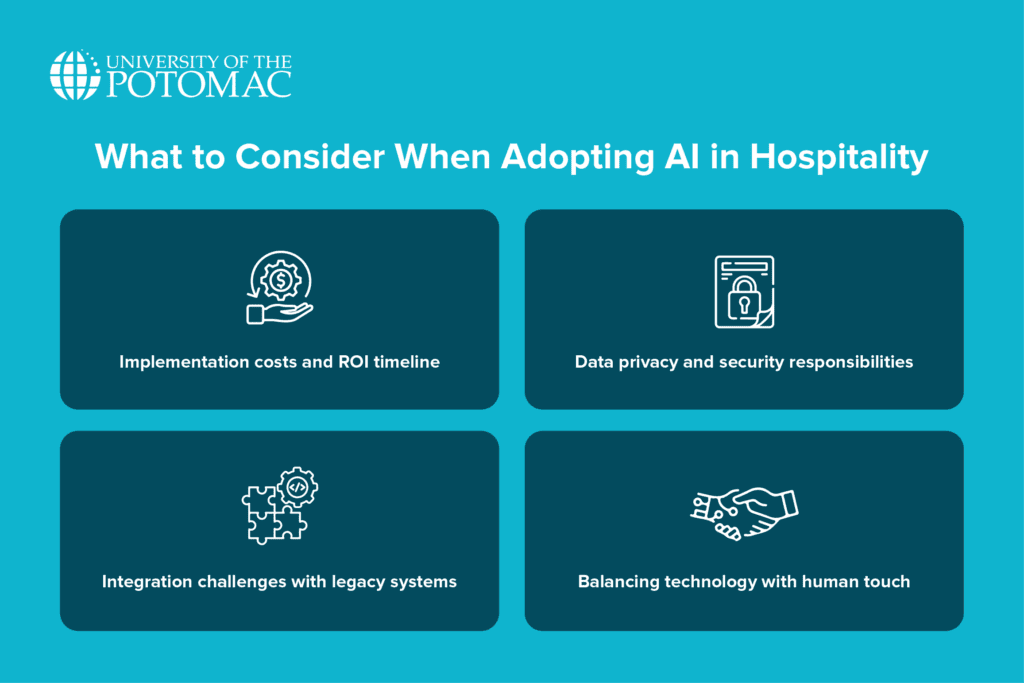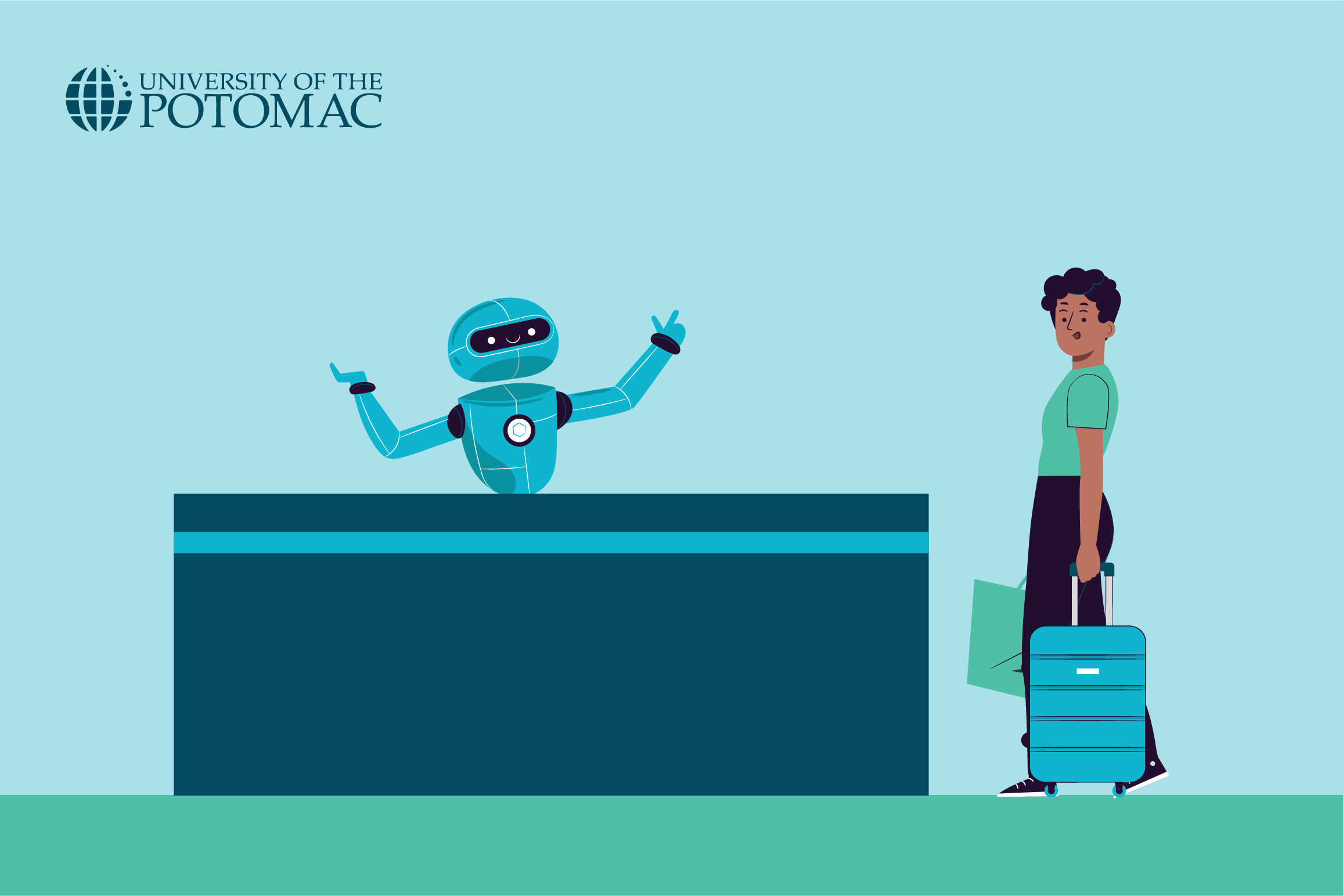Key Takeaways
- Adopting artificial intelligence is about redefining how hospitality businesses connect with guests, streamline operations, and strengthen financial performance.
- Robot housekeepers are being tested in major hotels, handling tasks like cleaning, laundry, and deliveries. Staff will still manage guest-facing roles, while robots take on repetitive work.
- AI implementation challenges include costs, data privacy, and balancing technology with human touch.
The hospitality landscape is changing faster than ever. Guests today expect smooth check-ins, immediate responses to their needs, and experiences tailored to their preferences. At the center of this transformation is artificial intelligence.
AI in hospitality is no longer a future concept; it’s actively shaping how hotels, restaurants, and travel companies run. From chatbots that answer questions at 3 AM to systems that predict exactly when housekeeping should clean your room, AI is making hospitality smarter, more efficient, and surprisingly human.
What Is AI in the Hospitality Industry?
AI in the hospitality industry refers to the use of machine learning, natural language processing, and automated decision-making systems to enhance guest services and streamline operations. Unlike traditional automation that simply follows fixed instructions, AI learns from data patterns and adapts to make smarter decisions.
You can think of AI as an exceptionally attentive concierge; one who remembers every preference, never overlooks a detail, and can manage countless requests at once. But instead of relying on years of experience, AI processes thousands of data points in seconds to deliver personalized recommendations and seamless service.
The core purpose is straightforward: create better guest experiences while making operations more efficient. From suggesting restaurants that match dietary needs to adjusting room settings before arrival, AI helps hospitality businesses deliver the kind of service that earns loyalty and generates positive reviews.
Core Applications of AI in Hospitality Today

From front desk interactions to behind-the-scenes revenue strategies, AI is setting new standards for service and efficiency.
24/7 guest support through AI chatbots
Hotels are using AI-powered chatbots to handle everything from room service orders to local recommendations. These digital assistants never sleep, never take breaks, and can communicate in dozens of languages. Guests can message to ask about checkout times, request extra towels, or get directions to nearby attractions, all without calling the front desk.
What makes these tools especially powerful is their ability to learn. If many guests ask about the hotel’s pet policy, the system begins proactively sharing that detail during the booking process, saving both staff time and guest frustration.
Highly personalized experiences
AI analyzes guest data to create highly personalized experiences. When you walk into your hotel room, the system might have already adjusted the temperature to your preferred setting and arranged for your usual morning coffee delivery time.
These adjustments aren’t guesswork. They’re powered by data from previous stays, booking patterns, and preferences you’ve shared. Some hotels can even predict which guests are likely to extend their stays and proactively offer room availability.
Smart room technology that responds to you
Voice-activated controls now allow guests to adjust lighting, temperature, and entertainment with simple commands. Smart mirrors display weather updates and local events, while advanced sensors detect when a guest leaves and automatically adjust energy use to conserve resources.
These innovations go beyond convenience. They are setting entirely new expectations for what guests should experience during their stay, raising the bar for hospitality worldwide.
Revenue management that maximizes profits
Behind the scenes, AI systems continuously analyze demand patterns, competitor pricing, and local events to optimize room rates. These systems can adjust prices multiple times per day, ensuring hotels capture maximum revenue during high-demand periods while staying competitive during slower times.
Benefits of Implementing AI in the Hospitality Industry

Adopting artificial intelligence is not just about upgrading technology; it’s about redefining how hospitality businesses connect with guests, streamline operations, and strengthen financial performance.
Enhanced guest satisfaction through immediate response
When guests have questions or needs, AI delivers instant answers and solutions. No more waiting on hold or hunting down staff members. This immediate responsiveness leads to higher satisfaction scores and more positive reviews.
Hotels find that guests particularly value resolving simple requests, such as asking for extra pillows or getting restaurant recommendations, without needing staff assistance. This is especially appreciated during late-night hours when fewer employees are available.
Operational efficiency that frees up staff
AI handles routine, repetitive tasks automatically. This means your human staff can focus on what they do best: creating meaningful connections with guests and handling complex situations that require empathy and problem-solving skills.
For example, AI can generate housekeeping schedules based on checkout times and guest preferences, while staff concentrate on ensuring rooms meet quality standards and attending to personalized guest needs.
Increased revenue through smart pricing and upselling
In addition to adjusting room rates, AI identifies upselling opportunities that guests actually want. The system might suggest a room upgrade to business travelers who frequently book executive floors, or recommend spa services to guests whose past behavior indicates interest in wellness amenities.
This targeted approach feels helpful rather than pushy, leading to higher conversion rates and increased guest satisfaction with their enhanced experience.
Data-driven decisions that reduce guesswork
Instead of relying on intuition, hospitality managers can base their strategies on AI-powered insights. This includes forecasting staffing needs for peak seasons, planning menus around guest preferences and local food trends, and monitoring operational efficiency.
The ability to predict demand patterns, identify emerging guest preferences, and spot operational inefficiencies before they become problems gives forward-thinking hospitality businesses a significant competitive advantage.
Challenges and Considerations for AI Adoption

While artificial intelligence offers enormous opportunities in hospitality, its adoption comes with complexities that businesses must carefully evaluate. From financial planning to data protection and maintaining the human element of service, each factor requires deliberate strategy to ensure successful implementation.
Implementation costs and ROI timeline
The upfront investment in AI technology can be substantial. Hotels need to budget for software, hardware, staff training, and often system integration costs. While the long-term benefits are clear, many properties need 12-18 months to see meaningful ROI.
Smaller properties and independent hotels may find these costs especially demanding. However, cloud-based AI solutions are increasingly making advanced technology more affordable and accessible across the industry.
Interested in pursuing a degree?
Fill out the form and get all admission information you need regarding your chosen program.
This will only take a moment.
Message Received!
Thank you for reaching out to us. We will review your message and get right back to you within 24 hours.
If there is an urgent matter and you need to speak to someone immediately you can call at the following phone number:
- We value your privacy.
Data privacy and security responsibilities
AI systems collect and analyze enormous amounts of guest data, ranging from booking preferences to in-room behavior. This creates serious responsibilities around data protection and privacy compliance, especially with regulations like GDPR affecting international travelers.
To safeguard both guests and brand reputation, hotels must invest in strong cybersecurity measures and maintain clear, transparent privacy policies explaining how data is collected, used, and protected. Transparency builds trust, while a single breach can cause lasting damage to credibility.
Integration challenges with legacy systems
Many hotels operate on property management systems that weren’t designed for AI integration. Connecting new AI tools with existing reservation systems, point-of-sale platforms, and operational software can be technically complex and expensive.
This challenge often requires phased implementation approaches, starting with standalone AI applications and gradually building toward more integrated solutions.
Balancing technology with human touch
The hospitality industry succeeds on personal connections and emotional experiences. The challenge is implementing AI in ways that enhance rather than replace the human elements that guests value most.
Hotels that take a progressive approach use AI to handle routine tasks, giving staff the freedom to focus on meaningful guest interactions, from acknowledging a returning guest’s anniversary to assisting with special event planning. This ensures technology supports the human touch instead of replacing it.
The Future of AI in the Hospitality Industry
The following innovations promise to redefine both what travelers expect and how businesses deliver.
- Hyper-personalization that anticipates needs. Future AI systems will anticipate guest requests, powered by increasingly sophisticated machine learning that analyzes patterns across millions of guest interactions.
- Robotics handling behind-the-scenes operations. Robot housekeepers are being tested in major hotels, handling tasks like cleaning, laundry, and deliveries. Staff will still manage guest-facing roles, while robots take on repetitive work.
- Advanced facial recognition for seamless experiences. Facial recognition could replace check-ins, unlocking rooms automatically while enabling personalized greetings and instant room customization.
- AR and VR integration for enhanced booking and experiences. AI-powered AR and VR will change how guests book and experience hotels. Instead of photos, travelers can take virtual tours tailored to their preferences. During stays, AR can guide, translate, and share local insights.
The Bottom Line
AI in the hospitality industry marks a fundamental shift toward delivering more personalized, efficient, and memorable guest experiences. From chatbots that provide round-the-clock support to pricing systems that optimize revenue, AI is helping businesses offer service that strengthens long-term guest relationships.
The key to success isn’t replacing human staff with technology, but rather using AI to handle routine tasks so people can focus on creating the emotional connections that make hospitality special. Over time, the businesses that thoughtfully integrate AI while maintaining their human touch will be the ones that thrive.
If you’re ready to build the skills needed for this technology-driven hospitality future, explore Potomac’s Bachelor of Science in Hospitality and Tourism Management to prepare you for leadership roles in this exciting field, or consider the Bachelor of Science in Information Technology to position yourself at the intersection of technology and guest service innovation.
Frequently Asked Questions (FAQs)
What are some examples of hotels that are successfully using AI today?
Major hotel chains like Marriott use AI chatbots for guest services and predictive analytics for maintenance scheduling. Hilton’s connected rooms allow guests to control everything through their smartphones, while boutique hotels use AI for personalized concierge services and dynamic pricing optimization.
How can smaller hotels or boutique establishments afford to implement AI?
Cloud-based AI solutions offer subscription models that make the technology accessible without large upfront investments. Many smaller properties start with chatbot services or basic revenue management systems, then gradually expand their AI capabilities as they see returns on their initial investments.
What is the first step a hotel should take when considering adopting AI technology?
Begin by identifying your biggest operational challenges or guest service gaps. Whether it’s handling after-hours inquiries, optimizing room pricing, or personalizing guest experiences, choose one specific problem area where AI can deliver measurable improvements. Start small, measure results, and expand from there.










